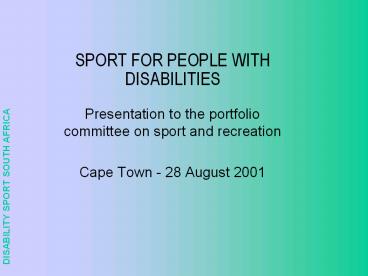SPORT FOR PEOPLE WITH DISABILITIES - PowerPoint PPT Presentation
Title:
SPORT FOR PEOPLE WITH DISABILITIES
Description:
History. South African Paraplegic Games Association formed 1960 - wheelchair only ... Volleyball. Wheelchair dance. Wheelchair rugby. Wheelchair tennis [Baseball] ... – PowerPoint PPT presentation
Number of Views:2793
Avg rating:3.0/5.0
Title: SPORT FOR PEOPLE WITH DISABILITIES
1
SPORT FOR PEOPLE WITH DISABILITIES
- Presentation to the portfolio committee on sport
and recreation - Cape Town - 28 August 2001
2
AGENDA
- History
- Activities
- Sporting achievements
- Structures
- Programmes methodology (TID, HPP)
- Funding
- Challenges
- Our commitment
- Cooperation with the portfolio committee
- Conclusion
3
History
- South African Paraplegic Games Association formed
1960 - wheelchair only - Expanded to include visually impaired, amputees
and those with cerebral palsy in 1978 - NAPCOSA formed in 1994 which included Deaf and
intellectually impaired - DISSA formed in 2001 to incorporate all
disabilities and programs
4
Active Sports
- Alpine skiing
- Archery
- Athletics
- Badminton
- Basketball
- Boccia
- Bowls
- Cricket
- Cross-country
- Cycling
- Equestrian
- Golf
- Goalball
- Hokker
- Lawn Bowls
- Netball
- Powerlifting
- Rugby
- Sailing
- Shooting
- Soccer
- Swimming
- Table Tennis
- Volleyball
- Wheelchair dance
- Wheelchair rugby
- Wheelchair tennis
- Baseball
5
Sporting achievements
- 1996 Atlanta Paralympics
- 5 world records
- 2 Paralympic records
- 10 gold (athletics, bowls, swimming)
- 8 silver (athletics, bowls, swimming)
- 10 bronze (athletics, bowls, shooting, swimming)
- 41 athletes competed in 5 sports
- 11 black, 28 women
- 2000 Sydney Paralympics
- 8 world records
- 13 gold (athletics swimming)
- 12 silver (athletics swimming)
- 13 bronze (athletics, cycling, powerlifting,
swimming) - 64 athletes competed in 9 sports
- 28 black, 28 women
6
2001 Sporting Achievements
- Deaflympic Games 2001
- 2 Deaf world records
- 2 Deaflympic records
- 8 gold medals (athletics, swimming)
- 2 silver medals (athletics, swimming)
- 3 bronze medals (athletics, swimming)
- INAS-FID World Athletics Championships
- 1 gold, 1 silver, 2 bronze
- CP-ISRA Games
- 9 gold, 2 silver, 3 bronze, 2 world records
- World Blind Bowls Championships
- 5 gold, 2 silver, 2 bronze team trophy
7
Structures
- Seven different disability groups
- Amputee
- Cerebral palsy
- Deaf
- Intellectually Impaired
- Les autres
- Visually impaired
- Spinal cord injuries
- Current affiliates
- Physically disabled
- Intellectually Impaired
- Deaf
- Not affiliated (unity process underway)
- Special Olympics
8
Status
- DISSA recognised as controlling body for
sportspersons with disability by - IPC
- ASCOD
- Ministry of Sport and Recreation
- Sport and Recreation South Africa
- South African Sports Commission
- National Olympic Committee of SA
- Supreme Council - Zone VI
- SA Commonwealth Games Association
- Office on the Status of Disabled Persons
- SA Federal Council on Disability
9
Programmes
- Strategy
- Inclusion
- Use of able bodied sports structures
- Development in SCSA Zone VI
- Focus
- Effective grass roots structures
- Development of regular competition at local level
- Identification and nurturing of talent
10
Methodology
- Coordinated approach on delivery (uniformity
through inclusion) - Development of a comprehensive database and
informative website - Establishment of unified DISSA provincial
structures - Presentation of Provincial and National
Championships (on an inclusion basis where
possible) - Establishment of disability specific sports code
bodies serving all disability groups - Implementation of inclusion agreements with
able-bodied federations
11
Talent Identification and Development
- Local events
- National championships
- Interprovincial championships
- Zonal (local) competition
- SCSA Zone VI competition
- People development
- Coaches courses
- Technical officials courses
- Athlete development
- Classifiers courses
- Administrators courses
- Development projects
- Sports days
12
High Performance Programme
- Effective programs focused on developing
identified athletes, classifiers and officials
with potential - Selective attendance at international sports
meetings for experience and qualification - Support of regional competition within Africa to
provide additional competition opportunities - Focus on sports that have the capability of
reaching gold balanced against representivity
(disability, gender, rural and disadvantage) and
individual vs team sports - Cooperation with the Sports Information and
Science Agency and CSIR
13
Funding
- Acceptance that we have to develop our own
funding sources - Current sources
- Government (less than 5)
- Sponsorship (limited to major events and
programmes) - Mainstream sports federations (through inclusion
programmes) - Current budget 2001-4 R22 million for
Paralympic sport
14
Challenges faced
- Costs equipment
- Accessible facilities
- Transportation parking
- Inclusion and the education system (different
definitions, training of educators) - Attitudes
- The media and access (improving)
- Confusion between the roles of SRSA and the
Sports Commission
15
Our commitment
- To facilitate inclusion at all levels while not
compromising service delivery to our constituents - To work with all disability groups
- To work with all able-bodied federations
- To promote sport for the disabled in Zone VI
the African Decade on Disability - To promote equity issues within our structures
gender, disability, rural, black, HIV/AIDS status - To ensure that every person with a disability can
reach their full sporting potential
16
Partnership with the portfolio committee
- Encourage inter-governmental department
coordination (health, welfare, sport
recreation, education) - Address disability grants
- Address problems with transport
- Address facility coordination and accessibility
built, to be built, hire costs - Encourage physical education in schools with
educators trained - Coordinated national programme vs provincial (and
municipal) competence - Issue to be top of mind for constituency work
17
Conclusion
- Eliminate duplication
- Cooperate with other sports bodies
- Close cooperation with Government at all levels
- Dedicated and hard working people
- staff
- volunteers

